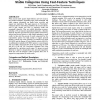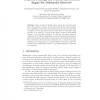113
Voted
SIGIR
2005
ACM
15 years 8 months ago
2005
ACM
Measuring the information retrieval effectiveness of Web search engines can be expensive if human relevance judgments are required to evaluate search results. Using implicit user ...
116
Voted
SIGIR
2005
ACM
15 years 8 months ago
2005
ACM
We describe a method for improving the precision of metasearch results based upon scoring the visual features of documents' surrogate representations. These surrogate scores ...
126
click to vote
JCDL
2005
ACM
15 years 8 months ago
2005
ACM
In this paper we discuss the architecture of a tool designed to help users develop vertical search engines in different domains and different languages. The design of the tool is ...
130
Voted
HT
2005
ACM
15 years 8 months ago
2005
ACM
We describe Eureka, a file system search engine that takes into account the inherent relationships among files in order to improve the rankings of search results. The key idea b...
HT
2005
ACM
15 years 8 months ago
2005
ACM
This paper introduces a new method for linking the world view of the search engine user community with that of the search engine itself. This new method is based on collecting and...
147
click to vote
WISE
2005
Springer
15 years 8 months ago
2005
Springer
Existing search engines contain the picture of the Web from the past and their ranking algorithms are based on data crawled some time ago. However, a user requires not only relevan...
128
Voted
WIDM
2006
ACM
15 years 8 months ago
2006
ACM
For a given set of search engines, a search engine is redundant if its searchable contents can be found from other search engines in this set. In this paper, we propose a method t...
100
click to vote
JCDL
2006
ACM
15 years 8 months ago
2006
ACM
When search results against digital libraries and web resources have limited metadata, augmenting them with meaningful and stable category information can enable better overviews ...
122
Voted
IMC
2006
ACM
15 years 8 months ago
2006
ACM
Search engines are a vital part of the Web and thus the Internet infrastructure. Therefore understanding the behavior of users searching the Web gives insights into trends, and en...
135
Voted
ADBIS
2006
Springer
15 years 8 months ago
2006
Springer
Abstract. Huge amounts of digital visual content are currently available, thus placing a demand for advanced multimedia search engines. The contribution of this paper is the presen...


